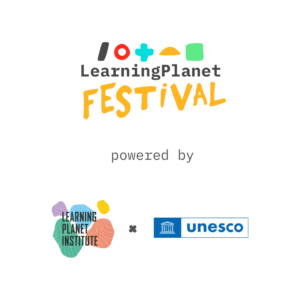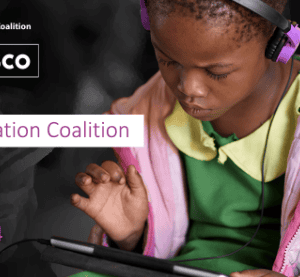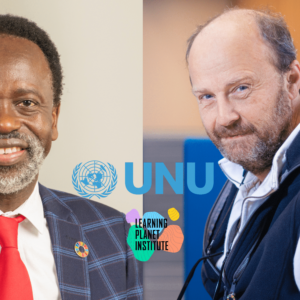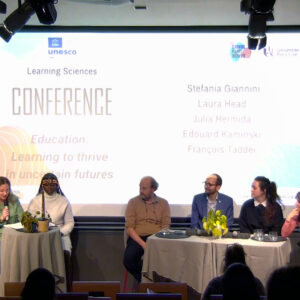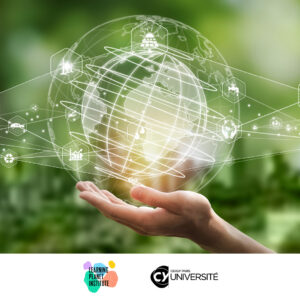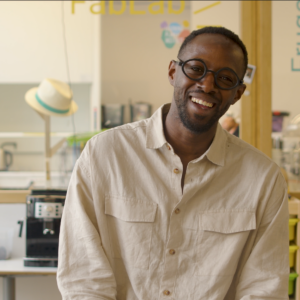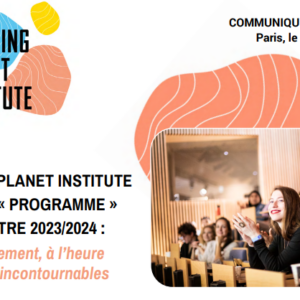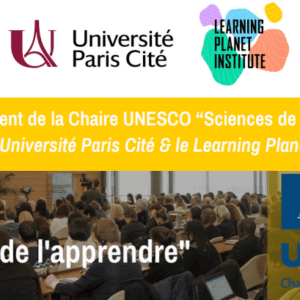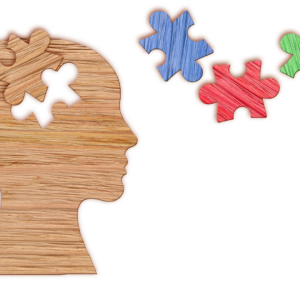By François Taddei, Director of the Learning Planet Institute, INSERM researcher, professor at the University of Paris, upcoming book Game Changing: Together Solving the Challenges of our Time, published by Calmann-Lévy, January 2022.
Confucius said that we have two lives, and the second begins when we realize we only have one. What if this were true not only of each of us individually but of us as a society—as a species even?
What if we weren’t invincible? If there’s been any silver lining in the Covid-19 experience, it was that we had to acknowledge and accept our vulnerability. For us individually, that meant realizing that functional societies are founded on solidarity with one another, and for political leaders, it meant coming to terms with the need for compassion is in policy making.
The gap between rich and poor is wider than ever and only widening in continuing onslaught of Covid-19. To rub salt in the wound, it’s increasingly becoming clear that the infrastructure of inequality is, ironically, our ironclad belief in meritocracy. Democratic societies are thought to be natural meritocracies because when people are able to operate on their own free will, the hardest workers will rise to the top. Yet this is far from the reality. The reality resembles more what American political philosopher Michael J. Sandel refers to as the “tyranny of merit” where meritocracy fosters a lose-lose situation for everyone involved. The so-called winners in such a system ultimately wind up dehumanizing themselves because the competitive landscape they dwell in renders them completely out of touch with their inner selves, let alone those of others, and the so-called losers in the system are thought to “deserve” their place, which can only stoke resentment. The world over, we see that class mobility is largely a myth, with the effects of inheritance of wealth and lack of intermarriage between classes being large determinant in one’s individual success. The meritocracy is essentially a new kind of aristocracy, fueling feelings of discontent, disillusionment, and resentment for those occupying lowlier “stations” in society. Sandel concludes that the rise of populism should come as no surprise to anyone.
Towards an Ethics of Humility in Public Policy
In order to bring real equal opportunity back into focus, we need to ditch the competitive mindset and for a more cooperative one. Sandel talks about humility as an integral part achieving the common good. Following the demonstration of vulnerability that Covid-19 has afforded us, we should all be feeling more apt to practice a little humility. Those in the community of climate activists were feeling very keenly the vulnerability of our planet, and this was long before the pandemic hit. At least now with Covid-19, no one can deny the feeling. That’s been the most significant change between the pre-pandemic world and now. Perhaps not everyone is yet on board, but there’s no denying the times have changed. Social-distancing and other health guidelines put restrictions on our social and emotional lives individually, and as a society the virus has put even further strain on our ecosystems, economies, and the cohesion of our communities. Our current feeling of vulnerability now is only proportional to the feeling of omnipotence that brought us to this critical juncture.
Our local communities are deeply divided, as is the geopolitical community at large, yet the choice we have to make is so simple, so unavoidable. Many, especially the so-called winners in our meritocracy, are least willing to change the status quo because they feel they have too much to lose. Yet the revolution we need couldn’t be easier to instigate, and we can only benefit from it. It’s making compassion a foundational tenet of every aspect of our lives, both inside and outside the halls of government. It means being more compassionate individuals and adopting a position of empathy when interacting with other. As a society, it means abandoning the mindset of dominion over the earth and so-called losers in our alleged meritocracy. The pandemic revealed to us that, rather than laws and government, what truly makes the world function is living with concern for others’ well-being and treating them with empathy. The front-line workers during the pandemic, the healthcare supermarket workers we took for granted in pre-pandemic times, now appear to us as the most crucial piece to our society’s ability to function properly. Compassion is a very old idea that today takes on a brand-new political significance because of the unprecedented global awareness of our interdependence. When one group or population is treated with a lack of compassion, we all lose in the end. Pre-pandemic, the single uniting experience of vulnerability and dependence on others was in our shared experience of infancy. Now we see that we remain vulnerable and in need others throughout our lives.
Interdependence is also more threatening than ever. If we don’t distribute vaccines and medical equipment equitably, the whole planet will continue to suffer. Variants develop in persons who are unvaccinated, which generates new waves of infection. Eroding biodiversity and our dependence on other species (most likely) got us into this mess, proving that we’re also dependent on other species, as much as we are dependent on the environment to survive. We’re all aboard the same ship, an interconnected earth, and she’s a tiny vessel indeed when looked at in comparison with the vastness of our galaxy, let alone the universe.
We need new shared stories to inspire us, new rules, new laws to ensure the integrity of our systems for caring for ourselves, others, and the planet. What I’m really calling for is a renewal of the Enlightenment. Does the old Enlightenment serve the interests of the few or the many? Regardless of its good intentions, is has not born out equitable outcomes.
The New Enlightenment Will Be Decentralized, Inclusive, and Ecological
To tackle the global crises we face, there’s more need than ever for international, intercultural, and intergenerational dialogue. The road from awareness to action is a long one indeed, but fortunately there are so many examples throughout the world of people taking action to guide us there. You may even know some of these people in your own life; they seem to bring to life the philosophy from South Africa much beloved by Nelson Mandela, Barack Obama, and others, the Ubuntu philosophy. The word Ubuntu is often translated “I am because you are,” expressing the notion of gratitude, compassion, and interdependence all bound up together. It’s somewhat similar to the proverb “It takes a village to raise a child,” which has been attributed to a number of different African cultures, basically expressing how communal transmission of knowledge is the path to enlightenment. That’s the blueprint for the New Enlightenment, only the community will be global.
The meritocratic tradition in education is founded not on transmission of knowledge but on competition in memorizing facts produced in bygone eras. Young people are an everlasting source of hope. Let’s reorient their education to teach them to collaborate with each other to equip them with the means to tackle the world’s most pressing challenges and map the future. There are already exercises out there to teach children how to empathize with their classmates. One involves asking every child to draw a common household object, say a glass bottle, then comparing all the drawings. They see how, though each drawing represents the same object, each representation is so different from the next, a metaphor for empathizing with different points of view. We likewise recommend gamifying learning for young and old learners alike such as by creating a kind of Olympics of community engagement where teams can win prizes based on their excellence in collaborating on projects that contribute to the common good.
Compassion on the Campaign Trail?
The European Commission has declared 2022 the European Year of Youth. There’s no better opportunity to fortify the Erasmus exchange program as it’s more crucial than ever for young Europeans to make contact with so-called “foreign” cultures as a way to build a more tolerant and peaceful future, but it’s not just the communities of Europe that are dovetailed; what’s true of Europe extends to every community around the globe such that we truly are one massive, interdependent family, making it so crucial to learn to care for each member of our human family.
Showing compassion isn’t just beneficial for those on the receiving end. It also helps those on the giving end to step outside themselves and their own problems and therein put their suffering in perspective. Treating others with more compassion is something each and every one of can do starting right now, and new shared stories that unite the interdependent human community can make it a priority to do so. To us, we see the new stories embodies in the people leading the countries that have held up the best against the virus. If you notice, they are primarily led by women. It’s as if, while male leaders seem to only usher in periods of warring states, women are ushering in periods of caring states. Take the incredible success of New Zealand Prime Minister Jacinda Ardern. Her policy of caring for the most vulnerable in society has helped soothe larger ills in society, and it won her re-election by a landslide. As many set out on the campaign trail in 2022, what if they could take inspiration from these female leaders and run on a platform of compassion?
This article was originally published by The Conversation, read it in french

